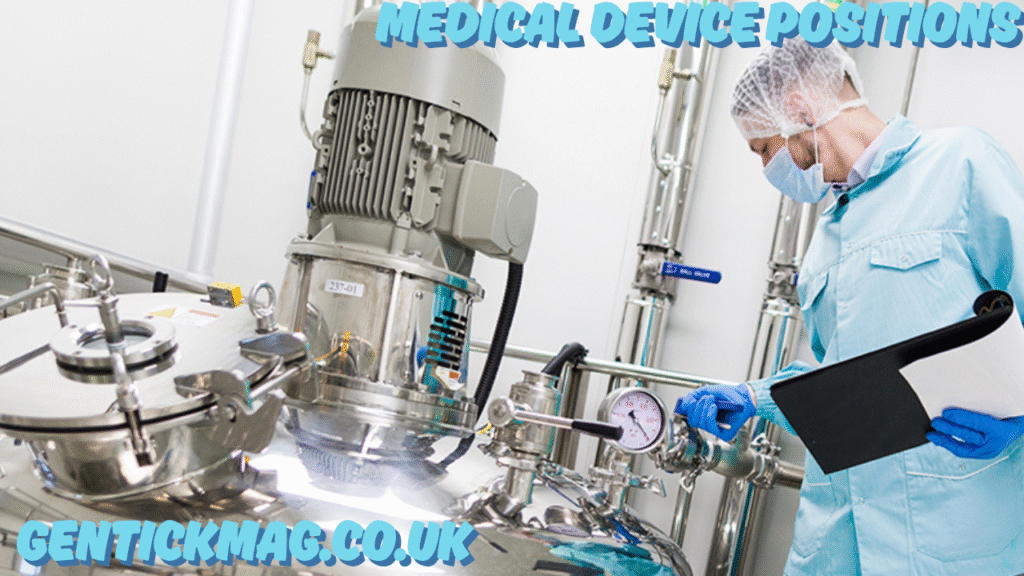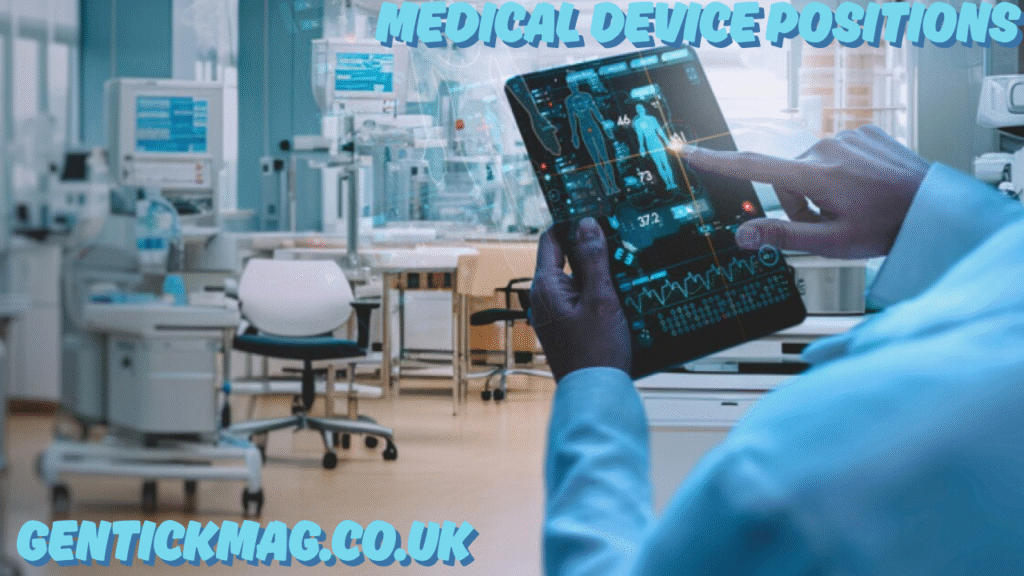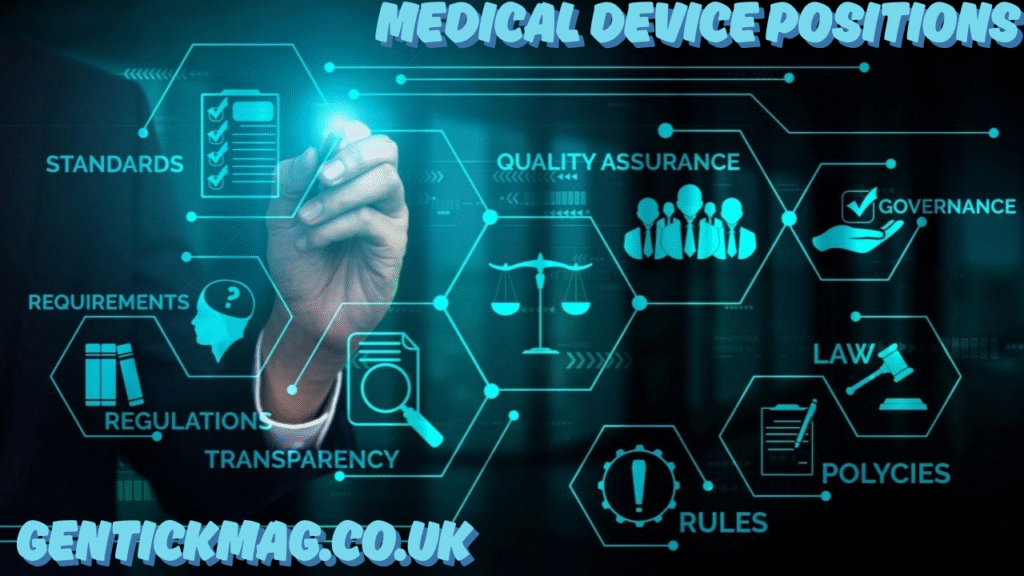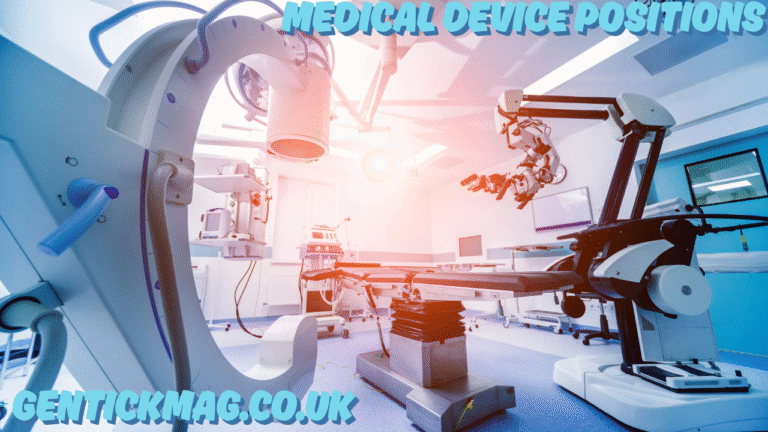The term medical device positions may seem straightforward, but within the healthcare sector, it opens up a vast array of career options. From research and design to regulatory affairs, sales, and clinical training, medical device positions are integral to the innovation, distribution, and usage of lifesaving tools and technologies. This article provides an in-depth look at the different types of roles in the field, the qualifications required, and how these roles are evolving in the modern medical landscape.
Understanding Medical Device Positions: A Multi-Faceted Industry

Medical device positions span across several disciplines. These roles contribute to the lifecycle of medical products ranging from simple tools like syringes and bandages to advanced devices such as pacemakers, imaging equipment, and robotic surgery tools. The sector is vital to improving patient outcomes, making it an appealing and impactful career choice.
There are three broad categories of roles in this sector: technical, clinical, and business-focused. Each category contains multiple specialized roles that contribute to the innovation and implementation of medical devices.
1. Engineering and Technical Medical Device Positions

At the core of medical device development lies engineering. Engineers working in medical device positions are responsible for product design, development, testing, and compliance with safety regulations. These positions include:
- Biomedical Engineer: Focuses on designing devices tailored to physiological applications.
- Mechanical/Electrical Engineer: Works on the structural and circuitry components of devices.
- R&D Scientist: Conducts research to innovate and improve existing technologies.
- Quality Assurance Engineer: Ensures the device meets rigorous safety and quality standards.
- Manufacturing Engineer: Works on process development and optimization in production lines.
These roles often require a strong foundation in engineering disciplines, along with an understanding of regulatory standards like FDA guidelines or ISO certifications.
2. Clinical and Regulatory Medical Device Positions

Clinical and regulatory roles ensure that medical devices are safe, effective, and compliant with health regulations. These positions often require a blend of scientific knowledge, legal understanding, and communication skills.
- Clinical Research Associate (CRA): Oversees clinical trials and ensures protocols are followed.
- Regulatory Affairs Specialist: Prepares submissions to health authorities, manages documentation, and stays updated on regulatory changes.
- Clinical Specialist or Educator: Trains healthcare providers on the proper use of devices, often working closely with sales teams.
- Medical Science Liaison (MSL): Bridges the gap between the company and healthcare professionals, offering clinical support and gathering field data.
Professionals in these positions frequently have backgrounds in life sciences, nursing, or pharmacy, and often possess certifications or advanced degrees.
3. Sales, Marketing, and Business Development Medical Device Positions
Sales and business-focused positions are crucial in ensuring that devices reach hospitals, clinics, and healthcare providers. These professionals also play a major role in educating customers and generating revenue for companies.
- Medical Device Sales Representative: One of the most well-known medical device positions, this role involves meeting sales targets, engaging healthcare professionals, and providing product demonstrations.
- Territory Manager: Manages sales and client relationships within a specific geographic region.
- Product Manager: Works on product strategy, launch planning, and market analysis.
- Marketing Communications Specialist: Develops materials and strategies to promote devices effectively.
Success in these roles often requires a strong understanding of both the products and the competitive landscape, coupled with outstanding interpersonal and sales skills.
The Skills and Qualifications Needed for Medical Device Positions
The qualifications for medical device positions vary depending on the specific role. However, several core skills are valued across the board:
- Technical knowledge: Especially important for engineers and clinical roles.
- Understanding of regulatory environments: Critical in compliance, quality assurance, and regulatory affairs.
- Communication skills: Necessary for collaboration between teams and with healthcare professionals.
- Problem-solving abilities: Vital in product development and troubleshooting issues in the field.
- Sales acumen: Essential for sales and marketing positions.
Educational backgrounds typically range from bachelor’s degrees in engineering, biology, or business to advanced degrees like an MBA or Ph.D. depending on the complexity of the role.
Career Growth and Industry Trends in Medical Device Positions
The medical device industry is growing rapidly, fueled by advances in technology and increasing healthcare needs. With innovations like wearable health monitors, AI-assisted imaging, and robotic surgeries, the demand for specialized roles is only increasing.
Some key trends shaping medical device positions include:
- Digital Health Integration: Devices are increasingly connected to apps and software, requiring more professionals in software development and cybersecurity.
- Global Regulatory Complexity: As companies expand globally, expertise in international regulatory standards is highly valued.
- Remote and Home-Based Healthcare: New roles are emerging to support devices used outside traditional clinical settings.
- Sustainability Focus: Environmental considerations are pushing companies to develop eco-friendly devices and packaging.
These shifts are creating new opportunities while reshaping existing medical device positions, making it a dynamic and evolving field.
Challenges Faced in Medical Device Positions
Despite the opportunities, professionals in the medical device sector also face challenges such as:
- Regulatory Hurdles: Navigating complex and changing regulations can be demanding.
- Product Liability and Safety Concerns: Mistakes or device failures can have life-threatening consequences.
- Competitive Pressure: The market is highly competitive, requiring constant innovation.
- Cost Constraints: Balancing technological advancement with affordability is a constant struggle.
These challenges necessitate a combination of innovation, precision, and regulatory awareness across all medical device positions.
Entry-Level Opportunities and How to Start in Medical Device Positions
For those looking to enter the industry, several entry-level positions provide a solid starting point:
- Sales associate or sales trainee programs
- Regulatory affairs assistant
- Clinical trial assistant
- Junior engineer or lab technician roles
Internships and co-op programs with medical device companies also offer valuable hands-on experience and exposure to multiple departments. Networking through professional associations, career fairs, and conferences is also critical for breaking into this competitive field.
Frequently Asked Questions (FAQs)
Q1: What are the most in-demand medical device positions today?
A: Sales representatives, regulatory affairs specialists, clinical educators, and biomedical engineers are currently in high demand due to the rapid growth of medical technology and changing regulations.
Q2: Do I need a medical degree to work in medical device positions?
A: Not necessarily. While clinical roles may require healthcare backgrounds, many positions (especially in engineering, sales, and marketing) only require relevant academic qualifications and industry experience.
Q3: What’s the difference between medical device and pharmaceutical positions?
A: Medical device roles often require a more technical or engineering-based skill set, while pharmaceutical roles are more chemistry and biology-oriented. Both fields, however, involve strict regulatory environments and clinical engagement.
Q4: Is the medical device industry stable for long-term careers?
A: Yes. The industry is considered highly stable and growing, especially as populations age and healthcare technologies evolve globally.
Q5: Are there remote or hybrid medical device positions?
A: Yes. Many companies now offer remote roles in areas like regulatory affairs, marketing, and sales, especially for territory management and digital product support.
Conclusion: Why Medical Device Positions Offer a Promising Future
Medical device positions are among the most promising and impactful careers in today’s healthcare ecosystem. From engineering and design to sales and clinical education, each role plays a vital part in bringing innovation to patient care. As healthcare becomes increasingly technology-driven, professionals in medical device positions will continue to shape the future of medicine, patient safety, and global wellness.
Also read : Lkink: Innovation, Identity, and Influence in the Digital Era
